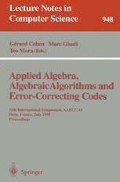Abstract
We address two topics related to the concept of minimal supports (codewords) in linear codes. In the first part we study the distribution of the number of minimal supports in random codes. In the second part, we propose a generalization of this concept for codes defined as modules over Galois rings. We determine minimal supports for some ℤ4-linear codes. Finally, we extend a recently established link between the cryptographical problem of secret sharing and minimal supports to the case of rings. The resulting secret-sharing schemes have fully and partially authorized coalitions, which permits, e.g., hierarchical access to a common resource.
Supported in part by the International Science Foundation under grant MEF000.
Preview
Unable to display preview. Download preview PDF.
References
D. J. A. Welsh, Matroid Theory, Academic Press (1976).
T.-Y. Hwang, “Decoding linear block codes for minimizing word error rate,” IEEE Trans. Inf. Theory, IT-25, No. 6 (November 1979), 733–737.
J. Massey, “Minimal codewords and secret sharing,” in: Proc. Sixth Joint Swedish-Russian Workshop Inf. Theory, Mölle, Sweden (1993), pp. 246–249.
G. R. Blakley and G. A. Kabatianskii, “Linear algebra approach to secret sharing schemes,” in: Error Control, Cryptology, and Speech Compression, Selected papers from Int. Workshop on Inf. Protection, Moscow, Dec. 1993, Springer Lect. Notes. Comput. Sci., 829 (1994), pp. 33–40.
A. Ashikhmin and A. Barg, “Minimal vectors in linear codes and sharing of secrets,” Preprint 94-113, SFB 343 “Diskrete Structure in der Mathematik,” Universität Bielefeld (1994).
A. A. Nechaev, “Kerdock code in a cyclic form,” Diskret. Mat., 1, no. 4 (1989), 123–139. English translation in Discrete Math. Appl., 1 (1991), 365–384.
A. R. Hammons, P. V. Kumar, A. R. Calderbank, N. J. A. Sloane, and P. Solé, “The ℤ4-linearity of Kerdock, Preparata, Goethals, and related codes,” IEEE Trans. Inf. Theory, 40, no. 2 (1994), 301–319.
G. R. Blakley and C. Meadows, “Security of ramp schemes,” in: Advances in Cryptology, Proc. CRYPTO '84, G. R. Blakley and D. Chaum, Eds., Springer Lect. Notes Comput. Sci., 196 (1985), pp. 242–268.
K. Kurosawa, K. Okada, K. Sakano, W. Ogata, and S. Tsujii, “Nonperfect secret sharing schemes and matroids,” in: Proc. EUROCRYPT '93, Springer Lect. Notes Comput. Sci., 765 (1994), pp. 126–141.
Author information
Authors and Affiliations
Editor information
Rights and permissions
Copyright information
© 1995 Springer-Verlag Berlin Heidelberg
About this paper
Cite this paper
Ashikhmin, A., Barg, A., Cohen, G., Huguet, L. (1995). Variations on minimal codewords in linear codes. In: Cohen, G., Giusti, M., Mora, T. (eds) Applied Algebra, Algebraic Algorithms and Error-Correcting Codes. AAECC 1995. Lecture Notes in Computer Science, vol 948. Springer, Berlin, Heidelberg. https://doi.org/10.1007/3-540-60114-7_7
Download citation
DOI: https://doi.org/10.1007/3-540-60114-7_7
Published:
Publisher Name: Springer, Berlin, Heidelberg
Print ISBN: 978-3-540-60114-2
Online ISBN: 978-3-540-49440-9
eBook Packages: Springer Book Archive

